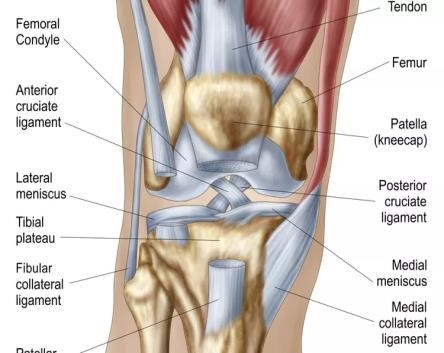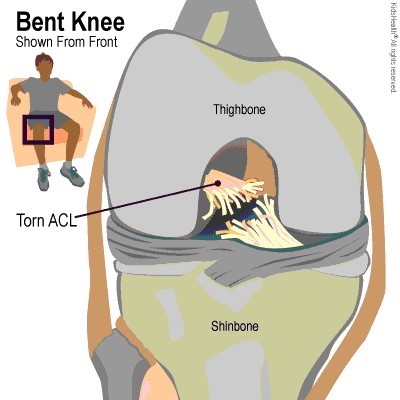Information for patients
This leaflet can be made available in other formats including large print, CD and Braille and in languages other than English, upon request.
About your injury
You have been diagnosed with a ruptured (torn) Anterior Cruciate Ligament (ACL).
Rupture of the ACL is a major injury to the knee. This leaflet is designed to give you more information about your injury and how it can be managed.
What is the Anterior Cruciate Ligament (ACL)?
A ligament joins one bone to another within a joint to add to its stability.
The ACL is the main ligament in your knee which helps keep your Tibia (Shinbone) and Femur (Thighbone) in the correct position.

How does an ACL Rupture occur?
ACL injuries occur most commonly during sports or activities which involve:
- Twisting,
- Sudden deceleration (slowing down),
- Landing from heights.
During certain movements the ACL is subjected to a large amount of force. Occasionally, the force can exceed the strength of the ligament and it tears.
It can also occur in a contact injury if the knee is twisted by an opponent, e.g. a tackle or collision.

You can rupture your ACL outside of sport by severely twisting or landing awkwardly.
When the tissue tears it usually causes bleeding into the knee, and the knee may swell straight away, or after a few hours.
When you rupture your ACL, you might also damage bone, cartilage and other ligaments. If this happens it will impact how quickly you recover as well as long term consequences.
Will a torn ACL heal?
A partial ACL tear does have a chance of healing.
A complete ACL tear has less chance of healing, but there is new evidence that suggests some complete tears may heal.
What happens when my ACL is damaged?
Your knee will require time and rehabilitation to recover. Working hard on your rehabilitation is key to a good outcome regardless of whether you have surgery or not.
After rehabilitation, some patients may have symptoms of instability (knee giving way), and other patients will have no instability symptoms.
What happens if I have symptoms of instability?
Instability is an unusual movement for your knee joint, and over time it can cause damage to your articular cartilage (smooth lining covering your knee joint) and menisci (shock absorbers).
If your knee twists when it gives way it can trap the meniscus between the bones causing it to tear. Repeated events of your knee giving way can put you at a higher risk of developing Osteoarthritis (pain, stiffness and reduced movement of a joint).
Instability is most common if you twist, jump, move sideways or stop and turn while putting weight on your knee. If you want to continue these activities your Orthopaedic Surgeon may offer an ACL Reconstruction.
What will help in the early stages following injury?
To help reduce swelling and pain, you should follow the POLICE principles:
- Protection – you may be offered a knee brace.
- Optimal Loading – you may be given crutches to reduce the amount of weight put on the injured joint. This can help control pain and swelling.
- Ice – the regular application of ice packs can reduce pain and swelling.
- Compression – you may be given an elastic compression bandage to reduce swelling.
- Elevation – this will help reduce swelling. Try to keep your knee above the height of your hip.
Following the POLICE principles should allow you to almost fully regain your movement and walk normally again. This is known as having a “quiet knee”.
Once you have a “quiet knee” a Physiotherapist or Rehabilitation Specialist with experience in ACL injuries can begin progressing your rehabilitation. If you have access to weight equipment this can greatly help progress your knee by rebuilding strength.
You will have regular reviews with your Physiotherapist or Rehabilitation Specialist to assist how your recovery is progressing.
What treatments can help?
You will need to take part in physiotherapy rehabilitation whether or not you need surgery (ACL reconstruction).
An ACL injury can be managed with rehabilitation alone, or with an ACL reconstruction (ACLR) and rehabilitation.
You may also benefit from an ACL brace which offers external stability to the knee.
Who is more likely to require surgery?
Not everyone who injures their ACL will require an ACLR. In some cases the initial option is rehabilitation rather than surgery.
Many partial tears will heal with non-operative treatment like rehabilitation. If the knee remains unstable following completion of rehabilitation then an ACLR may be offered.
The following factors are also considered before offering an ACLR:
- Your age,
- Your desire to return to playing sport or activities which involve jumping and landing, pivoting and/or fast deceleration,
- Your occupation (e.g. firefighter),
- How unstable your knee is,
- Whether you need any additional repairs within your knee.
If it is deemed before surgery that you are not fully committed to the time and demands of a rehabilitation programme, then you may not be offered surgery.
What does surgery involve?
An ACLR is carried out under general anaesthetic (a state of controlled unconsciousness).
If you are put on the waiting list for an ACLR you will need a pre-assessment to make sure it is safe to give you a general anaesthetic.
You will get an appointment letter in the post inviting you to attend the pre-assessment department.
Further details on ACLR are given in the booklet – ACL Reconstruction Surgery – which you will be given if you are listed for surgery.
Returning to sport
Do not attempt to return to sports which involve changing direction, jumping and landing or quick deceleration without your Rehabilitation Specialist giving you the go ahead.
If you are returning to a sport involving pivoting, decelerations, jumping and landing then your rehabilitation is likely to take at least 1 year.
Your Rehabilitation Specialist will carry out a variety of tests to assess your risk to make sure you are capable of returning to sport safely.
No test exist to say that you are absolutely safe to return to sport.
If you return to sport and your knee is not ready it may be prone to further injury. Each injury can do more damage to your knee.
Returning to sport at the same level
Many factors are involved in returning to sport at the same level as you played before your injury. The rates of return following ACLR from a 2015 study are:
- 9 in 10 people returned to sport in some form,
- 4 out of 10 people returned to their pre-injury level or sport.
Contact numbers
If you need further advice, or have any problems, please contact the telephone number below:
University Hospital of North Tees and Hartlepool
Mr Ramisetty’s Secretary
Telephone: 01429 522 621
Opening Hours: Tuesday to Thursday: 7:00am – 2:00pm
Further information is available from:
NHS Choices
Telephone: 111 (when it is less urgent than 999)
Calls to this number are free from landlines and mobile phones or via the website at www.nhs.uk
References
Ardern,Taylor and Feller et al. Sports participation 2 years after ACL reconstruction in athletes who had not returned to sport at 1 year: a prospective follow up in 122 athletes. American Journal of Sports Medicine. 2015 43(4)848-56. DOI:10.1770363546514563282
Brukner and Khan. Clinical Sports Medicine 5th Edition 2017 Ch35 p737 isbn 9781743761380
Eitzen,Holm and Risberg .Preoperative quads strength is a significant predictor of knee function two years after ACL reconstruction. British Journal of Sports Medicine 2009;43:371-376. Doi 10.1136/bjsm.2008.057059
Filbay et al. Evidence of ACL healing on MRI following ACL rupture treated with rehabilitation alone..British journal of Sports Medicine 2023:S7:91-98. doi:10.1136bjsports-2022-105473
Associated Leaflets
Anterior Cruciate Ligament reconstruction surgery. (2024)
Comments, concerns, compliments or complaints
Patient Experience Team (PET)
We are continually trying to improve the services we provide. We want to know what we’re doing well or if there’s anything which we can improve, that’s why the Patient Experience Team (PET) is here to help. Our Patient Experience Team is here to try to resolve your concerns as quickly as possible. The office is based on the ground floor at the University Hospital of North Tees if you wish to discuss concerns in person. If you would like to contact or request a copy of our PET leaflet, please contact:
Telephone: 01642 624719
Freephone: 0800 092 0084
Opening hours: Monday to Friday, 9:30am to 4:00pm
Email: [email protected]
Out of hours
Out of hours if you wish to speak to a senior member of Trust staff, please contact the hospital switchboard who will bleep the appropriate person.
Telephone: 01642 617617
Data protection and use of patient information
The Trust has developed Data Protection policies in accordance with Data Protection Legislation (UK General Data Protection Regulations and Data Protection Act 2018) and the Freedom of Information Act 2000. All of our staff respect these policies and confidentiality is adhered to at all times. If you require further information on how we process your information please see our Privacy Notices.
Telephone: 01642 383551
Email: [email protected]
Privacy NoticesLeaflet feedback
This leaflet has been produced in partnership with patients and carers. All patient leaflets are regularly reviewed, and any suggestions you have as to how it may be improved are extremely valuable. Please write to the Clinical Governance team, North Tees and Hartlepool NHS Foundation Trust, University Hospital of North Tees, TS19 8PE or:
Email: [email protected]
Leaflet reference: PIL1435
Date for Review: December 2026